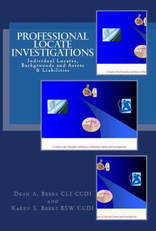
Just this week Dean was communicating with an old friend, Kelly Riddle, TCI (Kelmar Global – www.kelmarglobal.com in San Antonio TX) about database resources professional investigators use. At one time, it was not unusual for law enforcement to come to us for help with our resources – now they have some of the same access. This stared as a comment Kelly made to the Texas Association of Licensed Investigators listserv about what the best database is – a very common question, without one answer (even the providers will tell you). Kelly gave one of the best answers I’ve seen – based on his 29 years’ experience. In short, all information comes from the same sources – it is how it is searched (user) and returned (provider) that makes the difference. Because each case may have different inputs, and each provider has different data aggregating, algorithms, and reporting – the results may differ between providers. Within the providers, using the same input with different permissible purposes under the FCRA and GLBA, may produce different results. Sometimes inputting more information is better, sometimes less. There is an art to understanding all the nuances.
In our 30th year, our agency started with providing general individual locates, backgrounds and assets & liabilities records checks and investigations (there is a difference). While communicating with Kelly, he mentioned, “My first book “Private Investigating Made Easy” showed people how to do background searches before there was an internet…. good old gumshoe stuff!” How true! Dean’s first book, “Professional Investigations: Individual Locates, Backgrounds and Assets & Liabilities” (www.ProfessionalLocateInvestigations.com) offers the same history and necessity of this ‘gumshoe’ experience. This book was based on Dean’s first conference seminar, which became “Skip Trace Seminar on CD”. Early on, probably a decade before the book, Dean learned about these mysterious databases and asked a colleague. Needing to keep a secret, Dean was told, “I just entered the Social Security Number and had a new address.” – but he would not share the source. Being an investigator – without Google – Dean learned about sources and began to learn about them. He learned, Garbage In is Garbage Out.
Every professional investigator should know how data flows in and out with both public records and data providers. There is no magic wand, there are many mistakes, and all information must be verified before reporting. We often receive assignments from clients and colleagues requesting we conduct one of our general investigations. From time to time we are brought in after other attempts have been made and are unsuccessful.
Any record that is kept or provided is only as good as the chain of events involved. Remember: Garbage In Is Garbage Out.
GIGO still remains an easy way for absconders to manipulate their credit report - not as easy now as it was. All they have to do is apply for credit with a different address (now they check ID - but many clerks do not look or will overlook if you tell them you just moved). This becomes a red herring. It is also important to know how to sort the information and rule out when someone uses certain search criteria to pull credit header data (PIs, collectors, etc.).
This unintentional manipulation used to happen more (algorithms with data companies screen this out better) and is when you use an old address to pull up current information. The address you used gets put at the top as being current - making the actual current address move down.
Everything is a record and creates the paper trail, or map, lending to the information about the subject. How that record is maintained, stored and possibly disseminated, varies and influences the accuracy of the information. Any record that is kept or provided is only as good as the chain of events involved. At the beginning is the person that provides the information. If the applicant lies or fails to provide accurate information, then the information subsequently received is consequentially inaccurate. Persons are known to have fibbed just a little on a credit or job application.
The next link is the person recording the information. Any typos, misprints or other related mistakes also affect the record. These mistakes are often seen on personal credit histories, even civil and criminal histories – ‘official’ records. Following this would be the method of updating and record storage. All records are only as accurate as the frequency of updates. Some records are never updated. Finally, what about the provider of the information? Is the provider primary (the original record holder), secondary (bought the information from a primary record holder) or is the provider even more removed from the original record holder, such as an information provider (Consumer Reporting Agency)? Did they have accurate retrieval information and were they knowledgeable in how to obtain and verify the information?
Anybody can find information and present it, but is it reliable? Any error in this chain of record keeping will impact the ability to search the records, as well as the accuracy of the record and ultimately the investigation and findings. After the information is received, it is usually a simple and inexpensive task to verify any relevant information through a primary source or provider of primary source information.
Although suitable for searching and conducting only records checks, database and online records are not detailed or suitable as the end-result for a comprehensive background investigation. This is only summary information and detailed information is necessary. There is no harm, and actually a great benefit to summary records, but always proceed to detailed records if available. Current information will usually lead to finding historical information.
All individual investigations require the verification of the accuracy of the information provided and developed through our Investigative Protocol – Prepare (gather the preliminary known subject data), Inquire (conduct the background investigation), Analyze (review the known and obtained subject information and records), Document (ensure all official documents are obtained) and Report (compile the investigative report and supporting documentation). If at any stage of the Investigative Protocol there is any question, doubt, or concern – start over and do so before submitting any report that may contain factual or procedural errors or is otherwise incomplete.
No single record or repository, or single method of searching, should be relied upon.
This manner of investigation is not limited to general investigations. It is also important to Criminal Defense Investigations, as taught by another friend and colleague of nearly three decades – Brandon Perron, CCDI, CFI-FTER (Criminal Defense Investigation Training Council – www.DefenseInvestigator.com in Stuart FL). Stay tuned next month, as this topic is continued into defense investigations.
* Dean started our agency in October 1987, and Karen joined part-time in 1996 and full-time in 2012. Dean expresses his thanks and to personal and professional friends, Kelly Riddle and Brandon Perron. They first ‘met’ as original and close-knit contributing writers to the original PI Magazine, and continued as contributors with each new publish, multiple books and articles, training seminars and speaking engagements.


